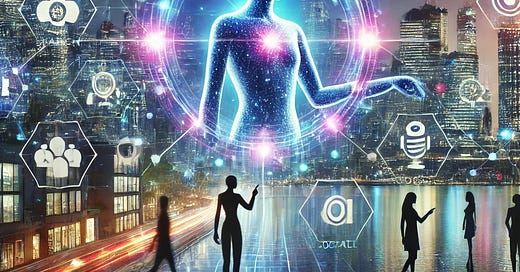Reflecting on 2024: Unveiling AI Breakthroughs That Redefined Innovation
A Year of Experimentation, Setting the Stage for Transformative AI in 2025
As 2024 comes to a close, it's time to reflect on the remarkable advancements in the world of AI that have defined this year. Based on my experiences, practices, and observations, I've identified five standout developments that have left a lasting impression. These are not just technological marvels but also pivotal milestones in the journey of AI's evolution. For some of these, I've already shared detailed insights in my blogs, which I'll link for those who wish to explore further.
The Emergence of Reasoning Models: This September, we witnessed the introduction of reasoning models that fundamentally redefined how AI models are trained. These models employed a novel training methodology called TTC, which set the stage for future model development. Unlike traditional LLMs, which faced constraints in terms of data and compute power, reasoning models pave the way for using synthetic data and reduced computational requirements. This innovation addresses the energy concerns associated with current AI technologies and promises a more sustainable future for model development. For a detailed exploration of this topic, you can check out my blog: AI's Growth Paradox: Why More Data Isn't Always Better.
AI-Based Search Revolution: This year marked a pivotal shift in how we interact with search engines, with AI-based search emerging as a game-changer. Perplexity has taken the lead in this market, challenging the dominance of Google, which now finds itself playing catch-up with its AI overview offerings. The competition has sparked innovations, and we anticipate a Perplexity-style solution from Google soon. On a personal note, my favourite development in this space is OpenAI's Search functionality, which was made available to everyone this December. For an in-depth look at this trend, please read my blog: From Blue Links to Direct Answers: My Journey with AI Search.
Advancements in AI Video Applications: This year's progress in AI-powered video applications has been remarkable. OpenAI's launch of Sora has set new benchmarks, while Google's VEO2 is gaining traction with positive reviews. Tools like Heygen have also shown encouraging advancements, signalling a promising future for video AI technologies. As we move into 2025, the potential for more groundbreaking developments in this area is immense. You can check out some of my experiments with Sora here: Sora AI - Experiments and Thoughts.
The Rise of AI Agents: Agents are set to become a defining trend as we head into 2025. This year saw notable launches by enterprises like Salesforce and SAP, showcasing the potential of AI agents in transforming business operations. Among startups, ElevenLabs stood out with its impressive voice AI module, which has caught my attention as a groundbreaking innovation. Both horizontal and vertical agents will play significant roles in this space. Vertical agents will be industry-specific or LOB-specific, such as customer service agents designed to address sector-specific challenges in healthcare or retail. Horizontal agents, on the other hand, will operate across industries and LOBs, like AI-driven workflow optimization tools or virtual assistants that support general enterprise functions.ty. I wouldn't be surprised if major enterprises show interest in acquiring or collaborating with such startups shortly. For a deeper understanding of the transformative power of AI agents, read my explainer blog: The Rise of AI Agents: Transforming Business and Beyond.
NotebookLM and the AI-Powered Podcast Revolution: Among the most impressive AI applications this year was NotebookLM. This tool converts documents into podcasts grounded in factual data with minimal hallucinations. This innovation is a boon for students and researchers, streamlining access to information in an audio-friendly format. ElevenLabs has also developed similar functionality, reinforcing the growing potential in this domain. I've personally experimented with NotebookLM, and the results were remarkable. You can check out my experiment here: Agentic AI by Subhankar Pattanayak.
Reflecting on 2024, it is clear that the year was all about experimentation. Looking ahead to 2025, we anticipate enterprises formalizing these experiments to derive real value. Companies that lead in AI adoption will undoubtedly deliver more to their customers, while internal AI integration within enterprises will continue to grow. Microsoft's Copilot has already set a high standard, and innovations like Anthropic's Artefacts and OpenAI's Canvas suggest that innovation will only accelerate.
Here's wishing you and your family happy holidays and a fantastic 2025. May the coming year bring more breakthroughs, lessons, and opportunities to embrace AI's transformative power!



